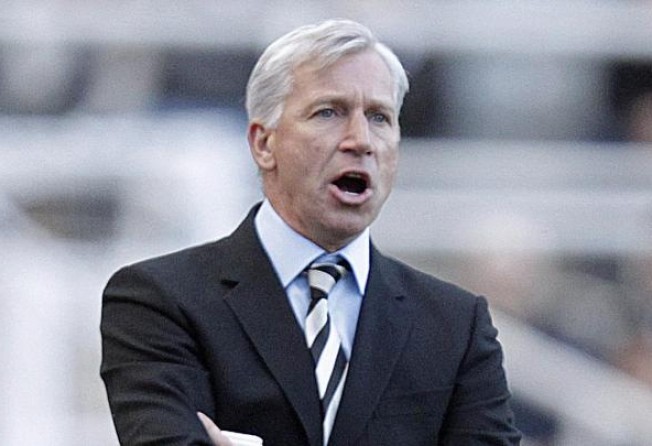Ghost goals make Fifa look dumb
A system for detecting when a ball crosses a goal-line should have been in place long ago, and the league will be judged harshly for the delay

Hey, referee! That was a goal! Or it was very, very close.
To be fair to Howard Webb and his team of touchline assistants, it wasn't humanly possible for them to judge whether it was or wasn't. It all happened in the blink of an eye.
The ball thudded off Manchester United's crossbar, down onto the turf and back up to head-height with Papiss Cisse. The Newcastle United striker from Senegal, not particularly tall but plenty quick, then headed it as hard as he possibly could at United's goal. Newcastle were 2-0 down at this point. A goal from Cisse could have put his team back in the game.
But United's young Spanish keeper, David De Gea, got a gloved hand to it. Diving acrobatically to his left, he scooped the ball away - either as it was crossing, or after it had crossed, United's goal-line.
Which was it? We'll never know. Machines exist that could have told us. But they're still not being used in football - making the sport and people who run it look silly.
Because this is silly. In years to come, we'll look back on this era when technology could have solved a glaring problem but wasn't quickly deployed and wonder how this was possible. How could the administrators of the world's most popular game have been so boneheaded and sluggish?
Did-it-or-didn't-it-cross-the-line incidents are a serious but treatable disease for football. Medicines are there to vaccinate against it, in the shape of detection systems with cameras or sensors to tell referees when a goal is a goal. The medicine should have been administered long ago.
Fifa is getting there, slowly and proceeding with extreme caution and lashings of red tape. Like those who took so long to accept that the earth revolves around the sun, Fifa boss Sepp Blatter won't be remembered for his U-turn in 2010 when he finally recognised the need for goal-line technology, but for the amount of time and evidence it took for him to reach that conclusion.
After rounds of testing over months and in different countries, proposed goal-line systems from eight companies have been whittled down to two: Hawk-Eye, using multiple cameras, and GoalRef, employing magnetic sensors. There'll be yet more testing, in competition this time, at Fifa's Club World Cup in Japan in December. That should clear the way for the use of these technologies at Fifa's Confederations Cup in Brazil next June and then for one or both to be used at Brazilian stadiums staging the World Cup in 2014.
Too late, in other words, to have helped Webb referee Newcastle against United on Sunday.
Even TV replays and magnified freeze-frames couldn't provide a conclusive answer as to whether all of the ball crossed the line before De Gea slapped it away. In real time, at that speed, and without the benefit of replays, Webb's assistant can't be expected to have seen it, either.
United manager Alex Ferguson was honest enough to admit that it wouldn't have been an injustice if Webb had awarded a goal, "because I thought enough of the ball's over" the line.
"It's inconclusive to be honest with you. The whole ball's not over but I would be disappointed if we didn't get a goal ourselves in that situation," he said.
The Newcastle perspective from manager Alan Pardew was: "It's so close to call. I've looked at it about seven times and I still can't make out whether it went in or didn't."
How absurd. Respected managers like Ferguson and Pardew and referees like Webb having to guess about the trajectory of a ball in the era of space travel. It's unfair to them. It makes football look foolish. And it happens every season, at every major tournament - with England's disallowed goal against Germany at the 2010 World Cup, followed by what should have been a goal for Ukraine against England at Euro 2012.
In May, the Premier League spoke of possibly introducing goal-line technology some time this season. That looks unlikely now. League spokesman Phil Dorward said on Monday that Fifa needed to license the technology before the Premier League could talk in detail to English clubs about deploying it, including how much it would cost and how long it would take to install. Fifa said "the licensing process is ongoing and more details will be provided soon".
"Until that's kind of fully approved, we can't go about the business of installing it," Dorward said. "We hoped it was something that could be introduced in-season, but of course these things are kind of subject to changes in time frame.
"We would like to see it as soon as practically possible."
United outplayed Newcastle on Sunday, scoring three times without reply. Cisse's header, had it been given as a goal, would have made the score 2-1 with 40 minutes to play. Pardew argued it could have kick-started a Newcastle comeback.
"The stadium would have gone mad," he said. "Suddenly we would have had great pressure and they would have got a bit nervous."
Or United might have won anyway. That's academic now. Still, who knows how important a goal for Newcastle, even if it didn't alter the result, could prove when these things are tallied at the end of the season? Last season, Manchester City and United finished top of the table with exactly the same number of points - 89. But City were crowned Premier League champions because their goal difference - between goals scored and conceded - was better than United's. So these things can matter.
This multi-billion-dollar global sport is always going to be full of what-ifs and maybes. But whether a ball crossed a line shouldn't be generating them.
Associated Press